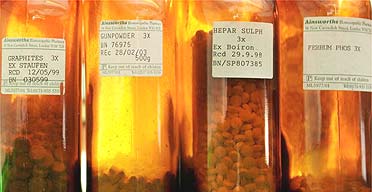
A group of leading British doctors called today for the NHS to stop using "unproven" complementary treatments such as homeopathy, sparking complaints of "medical apartheid" by proponents of the therapies.
The letter from 13 of the country's most eminent doctors was sent to every hospital and primary care trust in the UK, urging them to reject complementary treatments in favour of those "based on solid evidence".
The row erupted as Prince Charles, a staunch advocate of complementary medicines, used a speech to the World Health Organisation to call for the increased use of traditional remedies such as acupuncture and herbal cures.
The doctors' letter singled out homeopathy, in which a hugely diluted form of a remedy is used to treat patients, among the "unproven or disproved treatments" currently being funded by the NHS.
"It is an implausible treatment for which over a dozen systematic reviews have failed to produce convincing evidence of effectiveness."
"Despite this, a recently-published patient guide, promoting use of homeopathy without making the lack of proven efficacy clear to patients, is being made available through government funding."
The letter, organised by Michael Baum, emeritus professor of surgery at University College London and signed by Nobel prize-winner Sir James Black and Sir Keith Peters, president of the Academy of Medical Science, among others, complained that the use of such therapies drained resources from other areas.
"I'm all in favour of treatments that make people better but there is the issue of evidence," Professor Baum told BBC Radio 4's Today programme.
"How do we know that what we are witnessing is a real effect or a placebo? If the placebo is non-toxic and cheap, it doesn't matter.
"My concern is the issue of opportunity cost. If the NHS is spending good money on placebos at the cost of not providing effective medicines, then it does matter. "
The UCL hospital trust had spent £20m on refurbishing the Royal Homeopathic hospital, Professor Baum said, cash he claimed could save 600 lives a year if spent on the anti-cancer drug Herceptin and other conventional drugs.
Dr Peter Fisher, clinical director of the Royal Homeopathic hospital, conceded that the way homeopathy worked was not fully understood, but argued this did not mean it should be abandoned.
"I think what this suggestion amounts to is a form of medical apartheid: any therapy which can't trace its origins to what is called the biochemical model should be excluded from the NHS," he told Today. "The weight of the evidence does suggest that homeopathy is effective."
Prince Charles, a passionate advocate of complementary therapies, made his feelings in the matter plain in a speech to the World Health Assembly in Geneva that stressed the effectiveness of treatments such as acupuncture and St John's Wort, a herb used to treat mild depression.
"I believe that the proper mix of proven complementary, traditional and modern remedies, which emphasises the active participation of the patient, can help to create a powerful healing force in the world," the prince said.
"This is where orthodox practice can learn from complementary medicine, the West can learn from the East and new from old traditions.
"Many of today's complementary therapies are rooted in ancient traditions that intuitively understood the need to maintain balance and harmony with our minds, bodies and the natural world."
Charles first advocated the use of alternative medicines alongside orthodox treatments more than 20 years ago. He later established the Prince's Foundation for Integrated Health, which encourages the development of complementary medicines and integrated healthcare.

